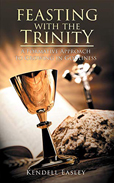
 |
Feasting with the Trinity: A Formative Approach to Growing in Godliness
by Kendell Easley
Stratton Press Publishing
Easley realized the answer to his own question about growing to be like Christ was best addressed through the renewed emphasis on the Trinity. Using this sorting strategy, he grouped various godliness approaches into three categories to arrive at a daily (breakfast, lunch, and dinner) feasting schedule with the Trinity. He expects this approach to guarantee that a reader will be rewarded with a well-rounded knowledge of Christian godliness.
Typically, a church focuses on a single concept, such as holiness. In this book, Easley links holiness with both the Father and the Spirit: the Father’s character and the Spirit’s advocacy on our behalf. Companionship and service are concepts linked to the Son. The author’s expertise in the subject matter is clearly evident. For example, a section on God and worldviews describes the current moralistic therapeutic deism (MTD) that is prevalent among young people. This worldview combines subsets of Christianity with Islam and arrives at a God who is not actively involved with human beings. However, Easley’s explanation of spiritual gifts versus natural-born talents remains close to the biblical teachings of the Apostle Paul.
This scholarly work ties church terms, such as theology and liturgy, to the concept that best illustrates them. Definitions are easy to understand when examined in the light of Father, Spirit, or Son. Theology is discussed at breakfast with the Father. Liturgy is discussed at supper with the Son, Jesus, in his church. Casual readers and serious students alike will find significant value in these twelve topics on Christlikeness. With each chapter followed by a list of reflective questions, the book is also meant to serve as a Bible study.
RECOMMENDED by the US Review